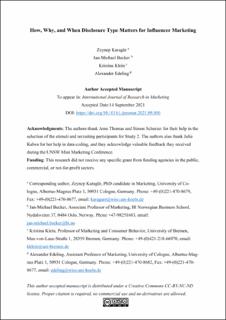| dc.contributor.author | Karagür, Zeynep | |
| dc.contributor.author | Becker, Jan-Michael | |
| dc.contributor.author | Klein, Kristina | |
| dc.contributor.author | Edeling, Alexander | |
| dc.date.accessioned | 2023-08-02T11:38:34Z | |
| dc.date.available | 2023-08-02T11:38:34Z | |
| dc.date.created | 2021-10-21T16:56:27Z | |
| dc.date.issued | 2021 | |
| dc.identifier.issn | 0167-8116 | |
| dc.identifier.uri | https://hdl.handle.net/11250/3082319 | |
| dc.description.abstract | Consumers’ changing media consumption behaviors and skepticism toward traditional forms of advertising have prompted the growth of influencer marketing. Even as regulatory authorities call on brands and influencers to disclose the posts as advertising, no consistent guidelines exist. The distinct effects of self-generated versus platform-initiated disclosures also remain unclear, nor has research addressed the interplay of key influencer characteristics and marketing disclosures. This article reports on findings from the first academic field study of influencer marketing disclosures, as well as three experimental studies, which indicate that disclosure is a double-edged sword. When provided through a platform-initiated branded content tool, disclosure consistently exerts the strongest effect on perceptions of advertising, negatively relating to influencer trustworthiness and consumer engagement. The effects of disclosure type also depend on the number of followers and number of previously endorsed products (i.e., influencer characteristics). Yet consumers also express appreciation for transparency when influencers disclose posts as advertising, which increases perceived trustworthiness of the influencer and engagement with the post. The implications of these findings should inform choices by public policy makers, brand managers, and influencers. | en_US |
| dc.language.iso | eng | en_US |
| dc.publisher | Elsevier | en_US |
| dc.rights | Attribution-NonCommercial-NoDerivatives 4.0 Internasjonal | * |
| dc.rights.uri | http://creativecommons.org/licenses/by-nc-nd/4.0/deed.no | * |
| dc.subject | Digital markedsføring | en_US |
| dc.subject | Digital marketing | en_US |
| dc.title | How, Why, and When Disclosure Type Matters for Influencer Marketing | en_US |
| dc.type | Journal article | en_US |
| dc.type | Peer reviewed | en_US |
| dc.description.version | acceptedVersion | en_US |
| dc.rights.holder | Elsevier | en_US |
| dc.subject.nsi | VDP::Bedriftsøkonomi: 213 | en_US |
| dc.subject.nsi | VDP::Business: 213 | en_US |
| dc.source.pagenumber | 313-335 | en_US |
| dc.source.volume | 39 | en_US |
| dc.source.journal | International Journal of Research in Marketing | en_US |
| dc.source.issue | 2 | en_US |
| dc.identifier.doi | 10.1016/j.ijresmar.2021.09.006 | |
| dc.identifier.cristin | 1947640 | |
| cristin.ispublished | true | |
| cristin.fulltext | postprint | |
| cristin.qualitycode | 2 | |

